This is a 4-part series on the Lewis-Clark Valley Loggers, a college-level football program composed of men who play and coach for the love of the game.
Part 3: It’s All About the Kids
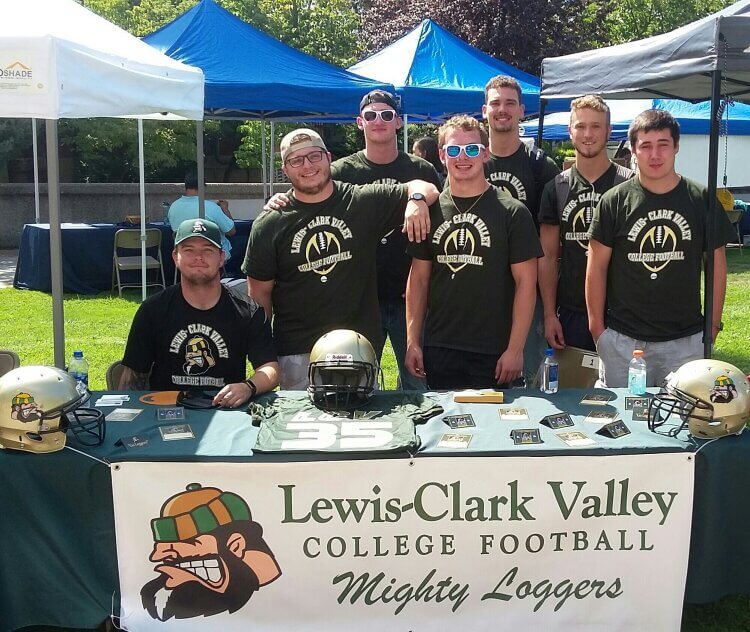
Lewis-Clark State College provides a supportive and affordable learning environment. Students choose it because they want small classes sizes, meaningful interactions with faculty and other students, and education opportunities rich in experiential learning. One student-athlete shared that he learned about the Logger program through a visit to his high school by an LCSC recruiter. He found that the combination presented an opportunity he couldn’t pass up – an affordable college, even for an out-of-state student, that provided a chance to play football, a sport he loved. He shared, “I wanted to play college football, but it was either go play at [a private university] and pay $60,000 or go, you know, be a roster dummy, be a practice dummy at, say, [an out-of-state school] or somewhere, and it worked out perfectly that I’d come to LC, [where] school was actually cheaper, play for the Loggers and actually play. [I] ended up starting game one and never looked back.”
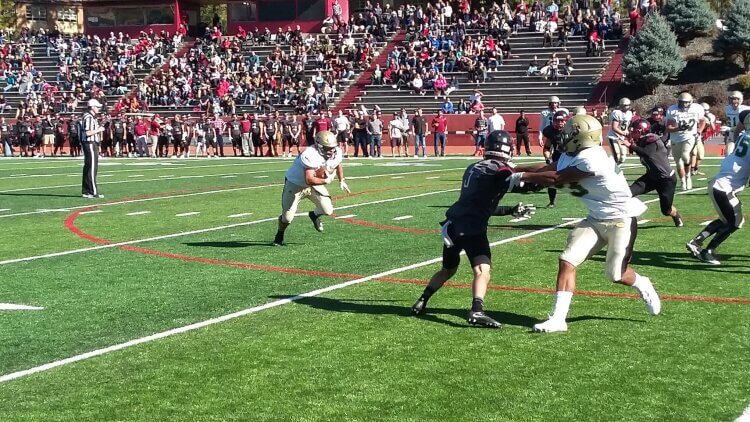
LC State and the Loggers have similar philosophies. They care deeply about providing a positive and meaningful experience for their students and are invested in their success. It is common practice to see members of the Loggers, with their jersey’s on, actively recruiting other students at the Lewis-Clark State College “Welcome Fair” each fall on the LC State campus. The opportunity to play is a critical piece of their identity. So much so, they are committed to helping the program grow by becoming actively involved in the recruiting process. One student-athlete shared that he gets excited when talking with other students about the football program because he shares what his former classmates are doing, like working for professional football teams or building rollercoasters. “How cool is that?!” he said, “You can come here and end up doing those kinds of things and you get to play football.” Student-athletes in the program take their role as recruiters seriously. They want to ensure the roster is healthy so they can continue to play a sport they love. The value they place in the activity is significant. Football is their true love. Additionally, they value the friendships they create with one another through shared physical suffering experienced in practice and games and the deep bonds created through long bus rides. As one player shared, “All the good stuff happens on the road.”
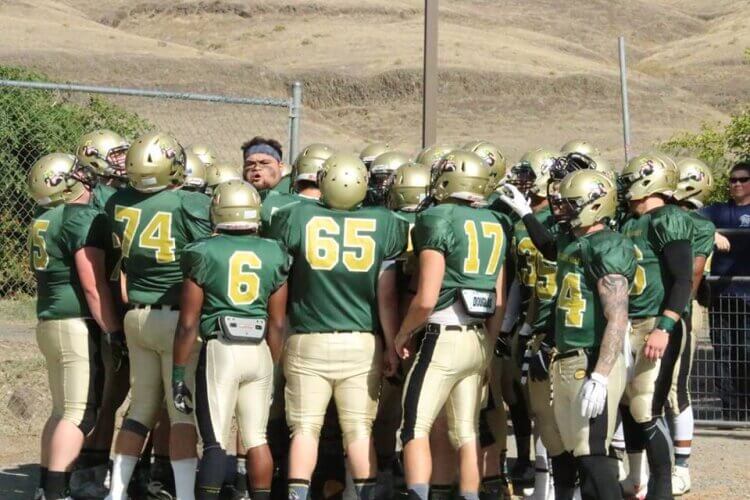
The Loggers definitely spend hours on the road. They go where they can get games. This has taken them to faraway locales including Michigan, Illinois, North Dakota, and California, in addition to all over the Pacific Northwest. They travel using a bus purchased by Program Director, Bob Thorson and, at times, driven by the head coach. Thorson shared,
“Obviously, we need to save our money for trips. In the past we, when we were doing more hotel or motel stays, sometimes in the early years we were going three or four to a room and shopping for the best motel prices we could, and sometimes that meant researching six months before the season and booking those, just things that you have to do that maybe other people wouldn’t think of, you know, because we’ve been able to get motels for half price or less, and again when we were three or four to a room, or driving over and back.”
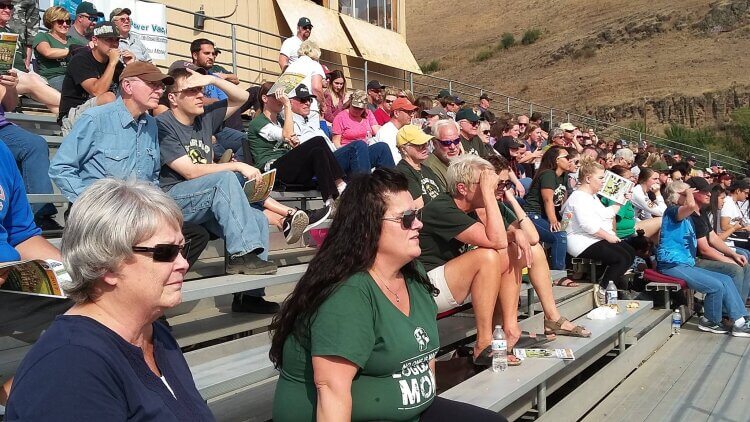
The program also had to be resourceful with meals for players and staff. As a veteran, former head coach, Jeff Schumacher, had access to VFW Halls for free, so when traveling, those often served as places to feed the team. To keep food costs down, sometimes Schumacher’s wife and mom made team meals. Schumacher shared,
“In Ellensburg, [Washington] we’d stop at the VFW Hall, and the kids would get off the bus, and my mom and wife and a daughter or two or whoever came with them would have dinner ready for them – or lunch, I guess it would actually be lunch – lunch ready for them. They’d come in and eat, we’d get on the bus and leave, they (wife, mom, and daughter(s)) would clean up, and then we’d get to the hotel. By the time we got to the hotel and get everybody’s rooms assigned and everything, my mom and my wife would then be out getting stuff set up, like a picnic-style dinner, so then everybody would go through and get dinner. And then the next morning, my mom would [get up at 3:00 am and] make an incredible breakfast.”
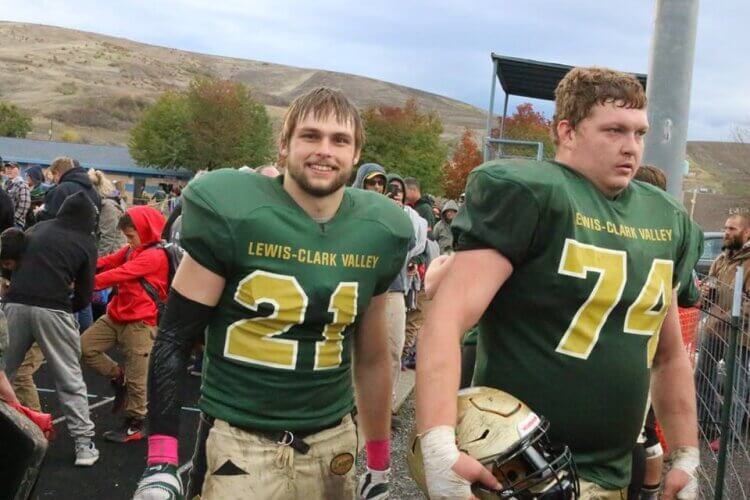
Thorson shared, “We pack a lot of food. So, it’s making a lot of sandwiches and getting some lasagna at Costco and packing the coolers, etc., and when you have to do that you can get by with a far smaller budget than other programs but still live nearly as well. It’s like with families. You can have one family that has a combined income of $100,000 a year and another with an annual income of $50,000. That’s quite a discrepancy, yet they seem to have roughly the same lifestyle or standard of living. Why? Out of necessity, some families learn to be very efficient and resourceful with far fewer dollars ‘falling through the cracks.'”
The program also had to be resourceful with equipment. “For example, when we first started, we bought about 100 pairs of shoulder pads from [a school in California]. Well, now those shoulder pads would have been – new they would have been a couple of hundred bucks apiece. We bought 100 for $500,” shared Thorson. “So, it’s keeping your eye out, again, like a professional yard seller, and finding deals, finding ways to [save] – now we can’t do that all the time, and obviously, we do have some heavy expenses. I mean, a new helmet costs about $350 bucks, give or take, depending on the model. So, it’s never easy but you just do what you have to do and be inventive and creative in doing it.”

Finding those deals is all about who you know. Thorson and his staff continually leverage their relationships with other coaches at colleges and universities and equipment representatives to find out about quality equipment for sale or equipment that can be refurbished for use. Schumacher described the time one college gave them four boxes of almost new game pants.
“I call Bob and I say, ‘Hey, I don’t know what you’re doing about game pants, but [name of college] has some game pants up here and they’re black and gold,’ and we hadn’t ordered jersey’s yet, and so he was like, ‘Well, why don’t you bring a pair down,’ and so I’m just going to take a pair of these. He (the University employee) goes, ‘You take one, you take them all,’ and so I said, ‘Okay, I’ll just take them all, if not we can just donate them, throw them away or whatever.’ And so, [name of college] was in the middle of switching [uniform brands] so they had gone and put a patch over the [brand] so they could wear them. So they just went through and had somebody sew on a patch over the brand, and I’m like, ‘Well, that’s a pretty good idea, maybe we’ll just take that patch off and put a Logger there or something, you know,’ so I grabbed the box, I picked the box up and carried it down to my pickup, and he’s got three guys up there helping him. The next guy comes down with another box of them, a guy comes down with another box – four boxes of pants.”
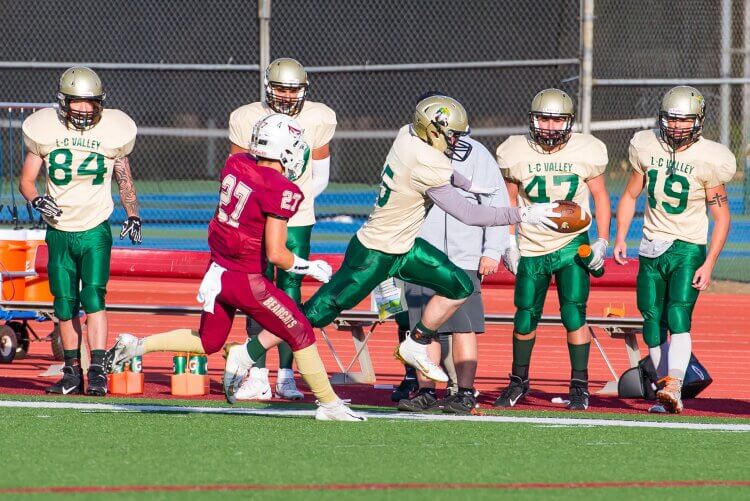
Driven by Passion – Jeff Schumacher
Football runs through Jeff Schumacher’s blood. With decades of coaching experience under his belt in other programs, he loves to talk X’s and O’s and pour over game film. He’s a bonafide coaching junky. As the owner of a local FedEx delivery operation, Schumacher had freedom during his workday and could adjust which days he worked each week to create time for coaching the Loggers. In the first year with the program, in addition to his full-time job with FedEx and pursuit of his undergraduate degree at LC State, Jeff’s goal was to introduce every high school in the state of Idaho to the Logger football program. In addition to Jeff visiting schools, Thorson sent out thousands of recruiting letters. Word spread fast and players from Idaho, Nevada, Texas, California, Illinois, Tennessee, and Florida showed interest.
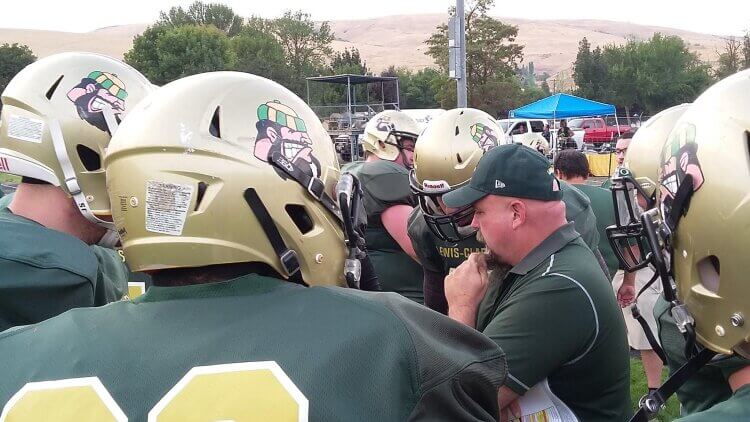
Given that football is a fall sport, conditioning begins before the fall semester. And, since the football program is not recognized as an LC State sport, student-athletes came to town before dorms were available to them. Finding a place for student-athletes to live could, at times, be challenging which meant that some years players ended up living in Jeff’s basement for a few weeks until an apartment or their dorm room opened. He, his wife, and kids welcomed them into their home, and included a few more seats around the dinner table. His family welcomed the team into their hearts and minds. Caring for the team was a true family affair. His oldest daughter helped with equipment set up for practices and games, his wife and mom helped prepare team meals, and his mom even helped clean the team bus after long road trips. Resourcefulness, careful use of program resources, and an unwavering commitment to student success facilitate the continued presence and growth of this unique college sporting experience. Participants embrace the program’s philosophy and make intentional decisions to remain engaged, thus contributing to its on-going success.
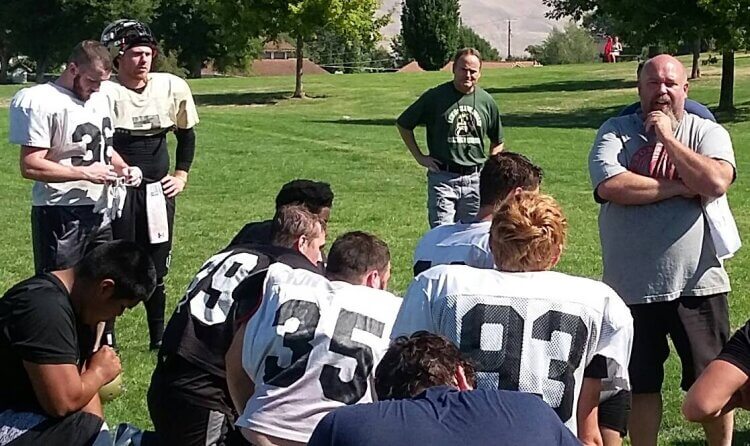
Airing it Out – Gene Straughan
Gene Straughan loves sports and he loves the law. An attorney, Straughan has taught college courses in law, government, criminal justice, and political science for over 30 years. Additionally, he’s been coaching sports, including football, basketball, baseball, and soccer, at multiple competitive levels for over 25 years. Known from his work with the Air It Out Football Academy, a business Straughan runs which takes him all over the Pacific Northwest working with youth quarterbacks and receivers, he was invited to coach quarterbacks and receivers for the Loggers. Straughan’s philosophy is centered around the value of education to one’s future.
“I tell the kids this all the time, only 20% of Americans get a bachelor’s degree. Like it or not, we’re a credentials society. It’s not that people with a bachelor’s degree are necessarily smarter than people without, but it’s a skill set that’s developed, you know, communication skills, analytical thinking skills and better understanding of human behavior and social institutions, that’s what a bachelor’s degree does, and if you’re in that 20%, you’re in a different pile, with degree and without degree. And, I always tell our kids there’s actually three piles, ‘with degree,’ ‘without degree,’ and ‘with degree overachiever.’ So, the thing for me was first and foremost education. Get your degree, go to class. And I love learning, I have the coolest job in the world. I’ve never come to LC and not wanted to be here because I get paid to learn and share that with others.”
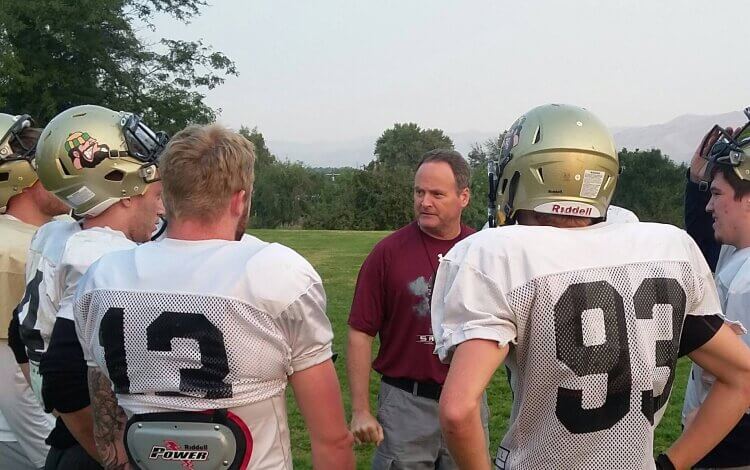
Straughan’s love for teaching and passion for coaching is illustrated in his unwavering commitment to the Logger program. Responsible for the quarterbacks and receivers, in addition to his coaching responsibilities, he checks in with players regarding their academic progress, offers tutoring in content areas in which he has a strength, and connects student-athletes with academic support colleagues on the LC State campus, as needed. All of these efforts add up to 20-30 hours of work. Additionally, he pays for his travel costs. Because of the responsibilities of his job as a college professor, he is unable to take off multiple days of work to attend road games. To ensure he can participate with the team during out-of-state road trips, he has to fly. The team budget can’t afford to purchase his ticket, so he spends several thousand dollars each season out-of-pocket.
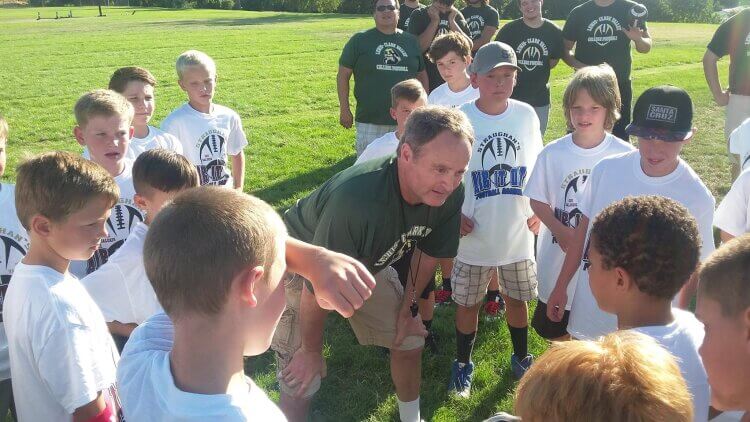
Straughan is committed to the healthy personal and athletic development of student-athletes in the Loggers program. He shared, “…even during football season, practice was two and a half hours, occasionally some film. But they could go to school, they could have a social life, they could play college football, and in two and a half months, we’re done, and then we want one thing, we want them to enjoy their lives and to do well in the classroom.” Gene is committed to creating and facilitating an environment that respects and honors the healthy growth and development of players. Student-athletes are valued and cared for. Straughan shared,
“I had a kid who came up to me today – not today, what was it, a week ago, after football. And he’s not a kid who’s really into academics. He came up to me and said, ‘Gene, I got a C, I got a C on my Intro to Criminal Justice exam…This kid was so excited because he had done worse, he had applied himself, he had worked hard, he got a high C, and I told him, ‘Well, you know, the next step is to turn it into a B.’ And he said ‘Yeah’, he said, ‘I think I can do it.’ And to me, that’s the part – this kid doesn’t go to college without football and he’s not here, and if he went somewhere else, honestly, the level that – the ability to succeed on the field and in the classroom – and so many of these kids nowadays, if they don’t play right away, they quit. And so, you know, the one thing that’s interesting about the Loggers is how you get a kid like that, and they’re like, ‘Okay, I can do this,’ and they see it, and they try.”
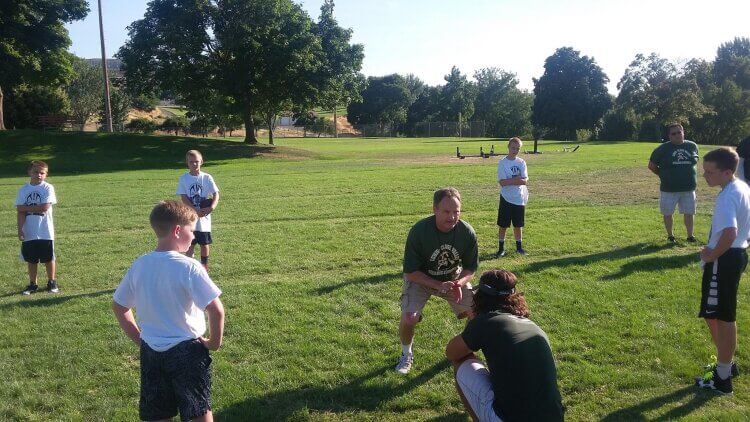
Up Next, Part IV. Finding their Niche
Part I.: http://www.pheamerica.org/2020/the-story-of-the-lewis-clark-valley-loggers-football-program/
Part II.: http://www.pheamerica.org/2020/the-story-of-the-lewis-clark-valley-loggers-football-program-2/
If you are interested in following the LC Valley Logger Football Program, please visit their website at www.lcvalleyloggers.com and check them out on Facebook at “Lewis-Clark Valley College Football.”
